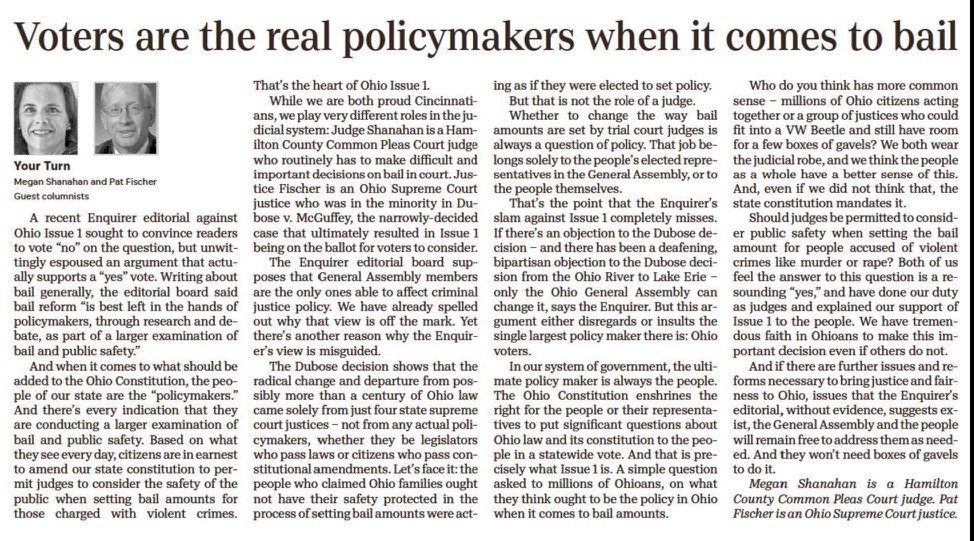Opinion: Voters are the real policymakers when it comes to bail
A recent Enquirer editorial against Ohio Issue 1 sought to convince readers to vote "no" on the question, but unwittingly espoused an argument that actually supports a "yes" vote. Writing about bail generally, the editorial board said bail reform "is best left in the hands of policymakers, through research and debate, as part of a larger examination of bail and public safety."
And when it comes to what should be added to the Ohio Constitution, the people of our state are the "policymakers." And there’s every indication that they are conducting a larger examination of bail and public safety. Based on what they see every day, citizens are in earnest to amend our state constitution to permit judges to consider the safety of the public when setting bail amounts for those charged with violent crimes. That’s the heart of Ohio Issue 1.
While we are both proud Cincinnatians, we play very different roles in the judicial system: Judge Shanahan is a Hamilton County Common Pleas Court judge who routinely has to make difficult and important decisions on bail in court. Justice Fischer is an Ohio Supreme Court justice who was in the minority in Dubose v. McGuffey, the narrowly-decided case that ultimately resulted in Issue 1 being on the ballot for voters to consider.
The Enquirer editorial board supposes that General Assembly members are the only ones able to affect criminal justice policy. We have already spelled out why that view is off the mark. Yet there’s another reason why the Enquirer’s view is misguided.
The Dubose decision shows that the radical change and departure from possibly more than a century of Ohio law came solely from just four state supreme court justices − not from any actual policymakers, whether they be legislators who pass laws or citizens who pass constitutional amendments. Let’s face it: the people who claimed Ohio families ought not have their safety protected in the process of setting bail amounts were acting as if they were elected to set policy.
But that is not the role of a judge.
Whether to change the way bail amounts are set by trial court judges is always a question of policy. That job belongs solely to the people’s elected representatives in the General Assembly, or to the people themselves.
That’s the point that the Enquirer’s slam against Issue 1 completely misses. If there’s an objection to the Dubose decision − and there has been a deafening, bipartisan objection to the Dubose decision from the Ohio River to Lake Erie − only the Ohio General Assembly can change it, says the Enquirer. But this argument either disregards or insults the single largest policy maker there is: Ohio voters.
In our system of government, the ultimate policy maker is always the people. The Ohio Constitution enshrines the right for the people or their representatives to put significant questions about Ohio law and its constitution to the people in a statewide vote. And that is precisely what Issue 1 is. A simple question asked to millions of Ohioans, on what they think ought to be the policy in Ohio when it comes to bail amounts.
Who do you think has more common sense − millions of Ohio citizens acting together or a group of justices who could fit into a VW Beetle and still have room for a few boxes of gavels? We both wear the judicial robe, and we think the people as a whole have a better sense of this. And, even if we did not think that, the state constitution mandates it.
Should judges be permitted to consider public safety when setting the bail amount for people accused of violent crimes like murder or rape?
Both of us feel the answer to this question is a resounding "yes," and have done our duty as judges and explained our support of Issue 1 to the people. We have tremendous faith in Ohioans to make this important decision even if others do not.
And if there are further issues and reforms necessary to bring justice and fairness to Ohio, issues that the Enquirer’s editorial, without evidence, suggests exist, the General Assembly and the people will remain free to address them as needed. And they won’t need boxes of gavels to do it.
Read the full article here
Cincinatti.com

